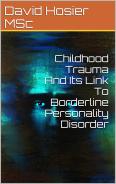Tags
Coping Mechanisms for Survivors of Childhood Trauma
In my last post I mentioned it might be useful to look at some coping mechanisms one may wish to make use of in the recovery stage from childhood trauma and it is to some of these that I now turn.
There are two main types of coping mechanisms:
1) Those which are helpful in the short-term, but unhealthy in the long-term.
2) Those which are useful in the long-term (but can take more effort and discipline).
Examples of the first include: drinking too much, use of illicit drugs, gambling, over-eating and taking anger out on others (and, almost always, later regretting it).
Examples of the second are: going for a walk, talking things over with a friend, having a relaxing bath or listening to music.
It should be pointed out that the strategies in the first category tend to leave the person with a lower sense of self-worth over time whereas the opposite tends to be the case with the kinds of strategies mentioned in the second category.
The key is to gradually reduce the use of the coping strategies in category one and gradually increase the use of the coping strategies in category two. This can take time.
BREATHING EXERCISES:
Another coping strategy is very simple but very effective (when I first learned this one I was dubious that something so simple could help and was surprised when it did) is to learn ‘controlled breathing’.
Under stress, we tend to HYPERVENTILATE (this refers to the type of breathing which is rapid and shallow) which has the physiological (and indeed psychological) effect of making us feel much more anxious. CONTROLLED BREATHING, on the other hand (breathing DEEPLY, GENTLY and EVENLY THROUGH THE NOSE) has the physiological (and, again, psychological) effect of calming us down. It is recommended by experts that with controlled breathing we should take 8-10 breaths per minute (breathing in AND out equates to ONE breath). With pratise, this skill can become automatic.
FORMING SUPPORTIVE RELATIONSHIPS:
Survivors of childhood trauma often find it difficult to form lasting relationships in adulthood (sometimes related to anger-management issues, volatility, inability to trust others and other problems). However, those who can form such relationships tend to have a much better outcome.
My next post will look at ways to help overcome difficulties in building and sustaining relationships. David Hosier. BSc Hons; MSc; PGDE(FAHE).



